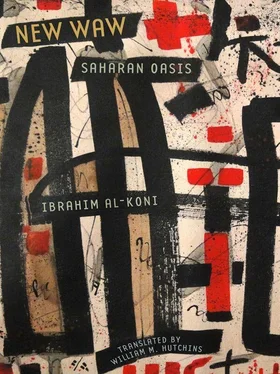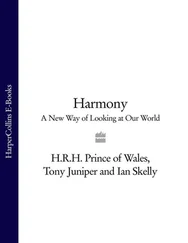______________
4. In Tamasheq in the original Arabic.
5. Tamasheq for shaykh, old man, leader, or grandfather.
6. The Jenny Master, a trickster figure in Tuareg lore and a passionate advocate for nomadism and for the she-ass — not the camel.
Nature likes continual creation and continual destruction, because nature is not fit to create anything that can be depended on.
Arthur Schopenhauer, The World as Will and Representation
1
But they did not know his secret; they did not understand why he contended with the rugged terrain every day to descend to Retem Valley. They did not know why he isolated himself there from morning to noon. They did not know because they had not heard the song; they had not been delighted by the Unknown’s anthem that hid in the groves of retem trees. If they had known, if they had heard, they would have realized that the leader would not reject being uprooted, would not refuse to order the people to move on and separate from their mother, the earth, merely because old age was drawing him to this place the way that the bird from the flock was drawn to the earth of the encampment. If they had heard, they would have realized that the leader would never have contravened the Law of past generations even if feebleness bound him with the strongest chains of iron. If they had heard, they would have realized that the matter involved a secret greater than decrepitude, stronger than a feeling of feebleness, and more profound than the disappointment with which anyone who reaches an advanced age and discovers that the path that previously swallowed his ancestors is the same abyss, the same gloom, and the same forgetfulness that awaits him.
He heard it for the first time a few days after they arrived in this land. He descended into the virgin valley, where the bottomlands were covered with a band of smooth sand marked by attractive folds reminiscent of the earliest days of creation when the original grandfather left his kingdom and ventured into the wasteland for the first time. Into this sandy expanse retem trees had raced each other, but rocky borders had crowded them out of the adjoining tract, depositing in the areas at the foot of the mountains swords cloaked with polished stones that time’s torrents had burnished till they gleamed in the sun’s rays. Trees had found no place to expand there. So they had turned back on themselves, massed together, and created in the valley bottom thick groves reminiscent of date palms in oases when they encircle springs of water, interlace, cohere, and cluster together as if to hide the spring from inquiring eyes, as if hiding the spring from people for fear they will envy this treasure. To the crest of upper branches of these groves come birds, doves, to build splendid nests. They lay eggs in the nests, sit on those eggs, and sing their monotonous melodies during the siesta hour.
In the retem grove he heard the bird’s song as well.
Unlike the doves’ songs, it wasn’t at all monotonous. Unlike the doves’ songs, it wasn’t monotone or monochrome. Unlike the doves’ songs, it wasn’t boring.
In this song, the bird’s voice modulated, there were multiple rhythms, parts rose and fell, the lament grew ever more intense, and the tune became purer and mixed with the wail of the wind in the crests of the retem trees, altering the ballad. Then the breeze died down and the lamento calmed, but the sorrowful sweetness, the sweet sorrow, never left the song. Indeed, the tune became more sorrowful and increasingly sweet and delightful. Then all the jinn in his breast awoke. They listened, reveled, and entered ecstatic trances, carrying him off through time to return to him what time had taken. They didn’t restore to him the harsh, lethal memory that lights a fire in the heart but never brings back what has passed away. Instead they spirited him off to a space where space does not exist. Then he found himself in a time where time does not exist; a space that has not yet become space and a time that has not yet developed into time. So he saw … saw what he had always tried to see. He saw what the desert had hidden from him. He saw what time had snatched from him. So he wept. He wept like a child. He wept because only a child sees nothing disgraceful about weeping. He wept because he had retrieved his lost childhood, which he had thought time and old age would never return to him. The bird fell silent, but the man did not return to the valley, to the desert, to space, to time. He remained in the world of the jinn for a period. He stayed suspended in a void devoid of all the characteristics of the void, hovering in space lacking the special qualities of space, soaring in a time that gave birth to no one and that swallowed no one, because it was a time that had not yet been born.
The bird fell silent, and stillness settled over the valley — the ancient stillness, the mysterious stillness, the hostile stillness, the lethal stillness, which declares in its mute tongue that the homeland that knows no spatial borders and that isn’t delimited by time is the only homeland for living beings, the homeland appropriate for living beings and for life, because it is a homeland that lies outside life. Why would a creature who one day visits that homeland and then finds himself put back in the cage bounded by feebleness, disability, and old age not weep? Why would the creature who has visited the homeland, to whom the Spirit World has been disclosed, not weep when he finds himself confronted by the eternal, stern, naked wasteland flooded by the mirage’s streaming tails?
2
Forty years ago they tracked him down in the distant grazing lands.
They came to him after he had been gone for some months.
He was afflicted by angst — a curse said to be especially common among poets — and went to the borders of the Western Hammada to find solitude as desert dwellers do when they suddenly discover that they have been afflicted by an incurable disease. But they did not grant him any respite. The elders did not cut him any slack. They came looking for him just days after the leader passed away. They told him that he was the deceased leader’s only sororal nephew and that he was therefore duty-bound to assume the tribe’s leadership. He argued with them. That day he debated with them. He was still young; so he argued with them. He told them he was a poet. He told them he was not merely a poet but an afflicted poet. When Emmamma asked what he meant by “afflicted,” he said naively that he was afflicted by a disease called sorrow. Then all the noble elders began to laugh. They shed their grave demeanor and all laughed together. He heard the elders laugh out loud for the first time. He was stunned that these sages would violate their eternal Law and guffaw in response to a statement that he thought wasn’t very amusing. He thought that they were perhaps laughing for some other, secret reason — not in response to his reply.
They immediately plunged their fists into the dirt to ward off the evil that their laughter might have aroused. They asked forgiveness from the god of the desert, vowing to slaughter a sheep when they returned to their encampment as a sacrifice to expiate the sin of laughter. Then … then they adjusted their veils over their faces, carefully concealing their noses, and brought themselves back into conformity with the Law.
Emmamma asked, “Do you want us to violate a tradition that no one in our community has ever violated?”
“The leader has sons brighter than I am and wiser than most men. Why shouldn’t they inherit the post of leader from their father?”
Asaruf shouted, “Do you want us to pass the drum to sons of a departed leader who leaves a sister’s son in the tribe? Do you want us to violate our forefathers’ decree — which we have inherited — carved on the tablets of the lost Law?”
Читать дальше












